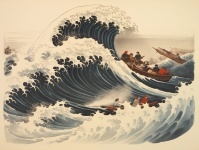Technology: rights or responsibilities? - Part X
By Dr. Andy Farnell
Back to Part I
Back to Part II
Back to Part III
Back to Part IV
Back to Part V
Back to Part VI
Back to Part VII
Back to Part VIII
Back to Part IX
Public and private tech
Let's explore two types of technology; social technology ("technology in the public interest") and proprietary technology.
The latter serves private power. Its motive is profit. It buys yachts and mansions for the few. Public technology is "sanitation". It carries your shit away so you don't have to sit in the same room with it all day after taking a morning dump. Public tech is rarely profitable. Private technology depends on public technology. Without the sewer pipes, there are no super-yachts, eventually.
To be clear, when we say social technology here we don't mean "social media". Social technology distributes ordinary utility amongst the people. It creates "common infrastructure"; power grids, railways, sanitation, and so on. It is the rather uninteresting fabric of civilisation which, when archaeologists dig up our bones in a few thousand years, will be the day-to-day rubble like plates, cups, jewellery, cellphones and laptops. It is also essential. Without it we perish, or at least regress to primitivism. It is that part of technology from which we may not retreat.
In contrast, proprietary technology is a spectacle and luxury. It is Pyramids. It is Moon landings. It is giant iron bridges from nowhere to nowhere, so that those nowheres might become "somewheres". Mostly, in any epoch, one can completely do away with spectacular technology and life just carries on.
That doesn't mean it has no value. Two theories justify it. One is the "spearhead" presumption, that without trail-blazing projects ordinary science would falter. I've heard claims that the drive to farm deserts is only possible because some "pioneers" want to do that one day on Mars. That leads to a "trickle-down" theory, which justifies the venture capitalists and philanthropic investors putting money into "crazy" projects. They claim the side effects will "benefit everyone". No end of modern advances are pinned on the Apollo (moon-shot) or Manhattan (atomic bomb) efforts. We even justify wars that kill hundreds of millions because they "spur progress".
But something smells a bit off about this popular claim. It neglects the accidental basis for much of science, like the discovery of penicillin and radium. It offers a weak assertion that wthout philanthropic billionaires and massive government grant bureaucracies, scientists would just sit around twiddling their thumbs..
If necessity drives public technology, ego is behind ostentatious spectacles. The cult of the "industrialist" seeking a legacy transcends mere utility or survival, seeking to "conquer nature", to "make things great again", or make a "mark on history". Predictably, and sad to say, it is a predominantly male activity.
Is this maybe why we have a "problem" in STEM recruitment of women? Of course there is no problem as such. We have simply defined STEM to be a tiny slice of sociopathic laser-brained culture. Role models like Elon Musk, Mark Zuckerberg and Silicon Valley "bros" ooze neediness and personal insecurity. They are so offensive as to turn-off anyone sensible, not just women, pacifists and "caring types".
In a way, one kind of technology is conservative, the other "progressive". One is domestic, stable and careful whereas the other is tentative, exploratory and cavalier. These have gotten out of balance. In a period of rapid advancement, by error of language, we have come to regard "technology" as a synonym for "progress", and so we have forgotten about another vital, nurturing side of it.
True "civilisation" is, in the end, rather boring - in a positive way. Social tech concerns itself with maintenance and burial as much as creation. It favours sustainability, organic culture, diverse education and free exchange of knowledge. It prefers distribution instead of centralisation, farms not cities, common protocols and standards, devolved or self-governance, books and free speech. It recognises customs and mores, democratically agreed regulation instead of unfettered growth and "anything goes" innovation. It is concerned with the daily grind of the polis, care and healing, the raising of children and the hub-bub of the marketplace.
To be done properly and safely, social technology requires more resources than the global capitalist system can afford, as amply illustrated by the failed healthcare system of the United States, and the failed private rail networks in the UK which are now in the process of being re-nationalised. In this sense capital lives beyond its means, and the costs put upon social technology as an invisible externality that subsidises the private sector. Amazon does not pay for the roads that carry its goods, nor Google for the education system that provides it programmers and engineers. Sometimes big business seems like a sulking teenager still in the house that does not pay rent or clean up its mess.
But history needs heroes, so the story of "progress" is not measured in hours of dull lab-work, housekeeping or conscientious research, but by breakthroughs and milestones achieved by "giants". Research money demands "impact". Getting your name on the paper is the anxious fixation of the desperate academic. We lionise them because it simplifies a story.
That story is itself a way to organise knowledge. Understanding and history are linked. As social creatures we find it easier to give names to concepts like Kepler, Euler, Gauss, Einstein and so on. We like to visualise events and artefacts like Stephenson's Rocket, Brunel's Bridge, Curie's Radium. In a sense, locomotives, bridges and radioactive elements did not exist before those people conjured them into reality - though of course they did.
As a reaction, the iconoclastic project of "decolonisation of science" expresses frustration at this "unfairly" simplified narrative. In my opinion it is rather pissing against the wind of time. Neurotic re-writing of history distracts from learning its lessons and moving on. At least we should fight outrageous claims made by impostors, fakes, frauds and last minute usurpers at the time they happen. Half of Americans think either Bill Gates or Steve Jobs invented computers. In the week that Steve Jobs died so did Dennis Ritchie. Apple plastered a black banded mourning image of Jobs on the start page of every Mac computer in the world. Jobs never met the man who made his success possible.
Although revisionists like to attack the story (for parochial political reasons), perhaps one of the most stable civilisations existed in central China, where for thousands of years each generation did largely what their parents had. This permanence seems unimaginable to us today in the West. It feels like death. Where is the growth? Where is the next big thing? Where is the promised Utopia? Where are the flying rocket-bikes?
Of course the industrial model of scientific progress is entwined with Capitalism and Marxism. It is revolutionary. It's side effect is to concentrate wealth. The "footsteps of giants model", let us call it that, apportions credit. It is "competitive" and turns progress into rewards of power. It necessarily invokes the conceit of "intellectual property" and small-minded obsessions over who got there first.
Now, private wealth is not in itself a problem, as private property is the cornerstone of liberty. The mistake of applied communism left a terrible stain on history (and if you liked the Procrustean knife of the Handicapper General wait till you see what "AI" has in store for the advancement of uniform mediocrity). Nor should we see private power as something abominable since it often stands in (self-interested) opposition to government tyranny. Checks and balances make social contracts work. Most crucially of course, individual reward and social status is a key driver in all primate societies.
But a runaway agglomeration of wealth has now created a new perhaps more urgent problem than any idealism. With capital comes the power to shape politics through technology. We are reshaping how private wealth is defined and who gets it. And that is happening outside established structures and institutions of governance. It's an old friend we call a revolutionary coup.
From a systems-theoretical viewpoint, this is an error. It means the direction of science and technology is no longer defined by human needs but only by egotistical fantasies and profit motives. In computer science we call it "self modifying code" - where the thread of execution is hijacked because the code is able to write over its own rules. In biology we call it mutagenesis. The result is usually collapse of the organism.
We've tried two distinct multi-lateral approaches to climate crisis over three decades. Industrialised nations like the USA repeatedly pulled-out of agreements and failed to deliver, Now we've arrived at one inescapable conclusion. The United Nations, World Health Organisation, World Bank and Intergovernmental Panel on Climate Change all now say that we must change the fundamental economic model of humanity.
No industry exemplifies the errors and excesses of our broken economics more than the tech industry. The sheer pace of innovation makes it exceptional. But to achieve that we stoke frenetic consumerism, deliberate non-interoperability, designed obsolescence, shameful waste, contempt for tradition and human values. We lionise egotistical sociopaths who want to "move fast and break things". Unlike previous industrial pioneers, these "tech leaders" are not the sharpest tools in the box, rather an array of arrogant college drop-outs who could not finish their computer science studies.
However, they believe they can "push through". Drawing a line under the old regime of democracy is back on the agenda after eighty years. Our new wannabe tyrants, the "technofascists", dare not directly challenge the democratic ideal. Instead they plan an end-run around the process itself through a dark cluster of controversial technologies being forced upon citizens (and of course manufactured by their "security" companies);
- biometric identity
- digital money
- electronic voting
- "AI" authority
- social control media
In concert these systems attack the active thinking, participation, debate, attention and inclusion/exclusion of citizens, creating inscrutable systems of influence, disinformation and invisible fraud which simply get the desired "election" results.
Seamlessly, protesters can be silenced, opposition marginalised, dissidents debanked, and the media managed. Effeminate "ethics" which enfeeble "inevitable" progress are easily attacked, often by mobilising mobs. Citizens are thrown off the scent by having systems suffer "technical failures" and "foreign influence" (never concretely ascribed or attributed other than to "bad actors", by pundits in the pay of oligarchs).
No doubt much blood will be spilled unless we stop them. One of the last hopes in the world seemingly lies with old government, in Europe and elsewhere, with human rights, global defence and trade organisations who see they are being usurped and are finally going on the offensive with harsh tech regulation. But in order to succeed they must go against their own authoritarian instincts.
Most seriously, in this situation technology becomes uprooted. The public (structural and conservative) purpose of technology is lost. Dark technologies for influence, election rigging, surveillance and thought-control produce exactly nothing of use. They are tools for established power to hold on. As a scientific instrument (for modelling and prediction) "AI" might produce some helpful advances. But as "fake people" it only destroys value and multiplies bureaucracy. All of this undermines the superstructure that allowed scientific progress and industrialism in the first place (schools, hospitals, common transport, actual effective government etc). Remember - no sewer-pipe, no super-yacht.
As with all self-propelled, aggressive campaigns and over-reaching empires, advancement cuts itself off as it over-extends its supply lines. An abstract noun, variously called an "economy" or "progress" becomes completely divorced from the requirements of the of democratic mass it ostensibly serves. The servant is master, The tail wags the dog. Presently the "point one percent" do not care about that over-reach, because they do not intend to "go back for" the rest of us.
They're moving faster now because Capitalism (viz Marx, Sombart) is in the process of ending. People are not sure what comes next. Marx having posited a so-far reliable socio-economic map of transformative process, with start, middle and ending, did not have much to say about the details of post-capitalism. Crucially, other than predicting an extraordinary glut of mechanised abundance, he had nothing to advise about how the feminine (conservative, nurturing side of) technology would survive after two centuries of rapid revolutionary (masculine) activity. An abundance of luxury is no use to those dying of neglect and despair.
There are broadly three camps. Many people expect and fear rapid collapse. For them, technology without growth is unimaginable. Another significant group subscribe to a patently infantile quasi-religious vision of "singularity", with humanity suddenly transcending flesh and uploading its collective brain into spaceships. Or something. Techno-Utopians still have the upper hand in the US and more broadly in tech culture.
The rest of us realists, pragmatists - those who fix things and make things and do things…. the "handy people" as writer Will Self calls us, are left with a bit of a puzzle. How to keep the ship running?
One thing we can be sure of is that Capitalism has the attention span and attachment maturity of a four year-old toddler. Anything it picks up will be discarded the moment it has no use. Like a soggy pumpkin on November 1st, or a sad Christmas tree slung in the alley in January. That's us. The "workers". Who now, of course, are not workers, but consumers of the great machine. It also includes the machine itself.
A machine to which we must now attend.
We are to be "relieved entirely of the trouble of thinking and of the effort associated with living". Except that it won't work out that way. Here comes the era of immense responsibility.
The (short lived) "owners" of the final, "perfect machine", won't have the first clue how it works. If they are like Stalin they'll round up and murder all the Bourgeois Engineers in anticipation of having their toys taken away by those who built them. And that will be the end of us. Nonetheless, it will all be lost to them in an extremely short period of history, either by force, or neglect, or decay. Or by their own abdication. The heroes of Capitalism are brilliant at building, but hopeless at taking care of anything. Wilful dereliction and "creative destruction" is their way to keep rebuilding, and so feel needed.
Whatever, future technology will not be something we have given to us, as now. We will not be an ant colony, spoon-fed in a land of milk and honey, subsidised by a 10 million year carbon windfall of cheap fossil fuels and foreign labour. Instead we'll be eternally tied to the responsibility of knowledge (recalling the theme of this journey).
One way this might look is a Red Queen's Race, in which the effort needed to keep the machinery of a technological-society running equals or exceeds available physical and intellectual labour. The knowledge burden (which education is totally failing to meet) is already upon us. As older generations who know how stuff really works die-off, the rest of us may be cut-off. This seems impossible or at least paradoxical, since we're automating our world to eliminate labour and thinking. Aren't we? Turns out a project to eliminate all work is simply another word for suicide. Life is, in essence, a labour unto death. The word "work" cleaves meaning. The trick is to make all labour, as in "ones life work" be not merely effortless but pleasurable, purposeful, and towards one's own ends not those of another man.
Consider cybersecurity today. The ten-ton elephant in the room. Hacking, fake news, disinformation, broken and untrustworthy computer systems… these are all signs that the machine is not well. And we who are maintainers and defenders of the machine are drowning, not because the water is deep, but because of the giant boot on our heads. Chaos plays well into the hands of the last few Capitalists. It is one more crisis opportunity for accelerating concentrated wealth. The machine is, fundamentally designed to be broken. We can only pray the saboteurs at Microsoft, Google and Amazon, quietly throwing spanners into the works, might turn out to be actual bona-fide Luddites with some respect for technology.
Now we start to see the real price of our freedom and comfort in the post-capital age. We will no longer be able to rest on the insanity of a few megalomaniac industrialists stomping off ahead and clearing the jungle for us because they have "something to prove" to daddy. The eternal ecstasy of the ever-new cannot sustain. We will have arrived.
As when the pioneers finally got to the West coast and said "That's it fellas, time to start home-building". Mr Fukuyama could not have been more premature about his "end of history". The greatest challenge, converting the fruits of capital into lasting next-stage civilisation, and keeping it, is what we now face.
And no, there will not be an "elite" cadre of quiet technologists who somehow, magically and separately from all prior history and society, "take care of things". Reality of survival requires more than naive Platonism.
The bad news for the neophytes, is that really "boring", home-building, peace-making work is afoot. We face an era of consolidation, maturing and putting aside childish things. Omnipresence, omnipotence and omniscience will need to go into the box of comic books in the attic.
One of our challenges then is to recognise, understand and to prevent the feminine technology (socially structured) from evaporating. Protecting science, culture, arts and education (which are kinds of technology) is vital if we are to survive the coming winter of emptiness and apparent purposelessness. Especially challenging is what to do with those riding the wave of reckless ambition - the lost engineers looking for new problems for their "solutions", and those who play Monopoly and board games on Wall Street and in The City. Technological post-capitalism will need a way to gracefully retire those people too.
The grown-ups must, by retaking and re-purposing digital technology during late-stage Capitalism, preserve the commons and the true spirit of the technological-age (which has almost nothing to do with capital). We have to stop it from being freeloaded and co-opted to serve selfish short-term interests - and even turned against its creators. Otherwise - to make a space-engineering analogy - we will have burned all our fuel achieving escape velocity, but have none left for the mission. We must see Science itself is social capital which has been hijacked and become a tragedy of the commons. Science must be rescued from the present madness of technology.
An insight is to recognise that the flailing, runaway machine of terminal capitalism may not go gracefully. It is after all, one more fatally flawed ideology, nothing more, containing the seeds of its own end. Weak and old, it's now failing to produce even the ideals it claims to uphold like individual liberty, economic prosperity, and social mobility. It does not, in itself, respect technical knowledge. For it, science and technology were always a means to an impossible end (the infant urge: total power and control of everything).
Like any dying creature it is frightened and rages against the darkness and is quite self destructive. The destruction of digital institutions like the Internet Archive - and perhaps soon the Internet itself, is to be expected. Like a bitter retreating army it may choose to scorch and salt the earth.
For thousands of years Science has been an institution transcending national borders and private interests to concern itself with the "advancement of humanity". We must get a perspective, revise the architect's plans and reconnect to the Creator's vision. Only relatively recently (the Industrial revolution and golden age of non-linear physics) have many pernicious changes befallen Science (capital S).
Though Capitalism will eat itself, we must not turn against the fruits of our labour. They are, after all, ours. Won at great cost. To steer a safe course we must be able to select which technologies are useful, nourishing and sustaining, and which are toxic and part of the old hyper-masculine stage of conquest and growth.
That means rescuing Science. In the latter twentieth century the radical privatisation through global capital ate-up university research departments, journals, publishers and finally the teaching done in schools and colleges. This significantly distorted the direction and priorities of the scientific project. We want to put colonies on Mars ahead of clean drinking water here on Earth.
An insanely energy-intensive misadventure of "AI" is the latest excuse for the boys to carry on a game of hyper-industrialisation and drunken gambling. While millions go without heat and shelter, now the "bros" want personal nuclear power plants to feed their hungry data centres, to make slop, spam and fake-humans.
Our task now, as responsible scientists, as responsible humans, is to transform into takers of technology, and then back to makers, not just passive receivers of it. Our judgement is now required. Indeed progress demands it. Whether through government regulation or social movements the big "take-back" of tech is coming.














